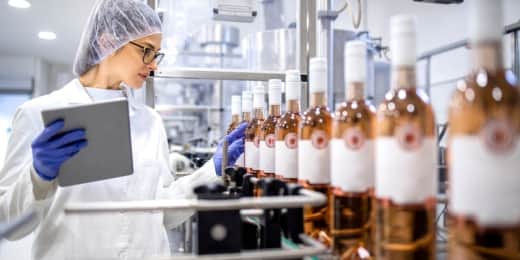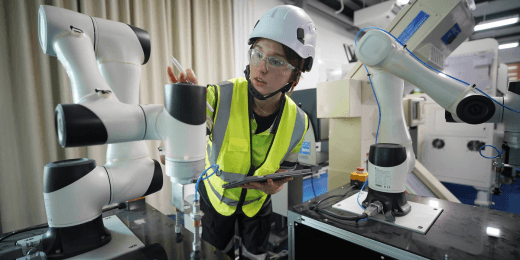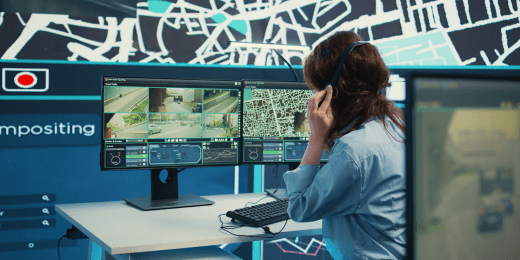Guide to Enhancing Production Efficiency in Beverage Manufacturing
Explore beverage manufacturing from formulation to sale, best practices for safety and efficiency, and learn ways to streamline the production process

Published 18 Feb 2025
Article by
SafetyCulture ContentTeam
6 min read
What is Beverage Manufacturing?
Beverage manufacturing is the process of transforming raw ingredients into ready-to-drink beverages, ranging from soft drinks and juices to alcoholic beverages and bottled water. It aims to create shelf-stable products that are safe for consumption and have a long shelf life.
Key Processes
Beverage manufacturing includes several essential processes to produce high-quality drinks. While the exact process can differ on the beverage type, they typically involve:
Research and Development
This initial stage involves creating new beverage formulas and improving existing ones to meet market demands and regulations. It also includes sourcing ingredients, researching consumer trends, and conducting taste tests to ensure the final product meets customer expectations.
Ingredients Sourcing and Treatment
After researching, beverage manufacturers source raw quality ingredients such as fruits, grains, or herbs. Then, treatments such as water, sugar, and juice pulp treatment are carried out to ensure the ingredients are safe for consumption.
Formulation and Mixing
In this stage, the sourced ingredients undergo precise recipes that create the desired beverage. This includes balancing flavors, colors, and nutritional components. These formulas are tested to ensure consistency across batches.
Processing and Filtration
This process ensures that the beverage is safe for consumption. Clarification, prefiltration, and final filtration are commonly employed to remove particles, bacteria, and other unwanted elements that could affect taste and safety.
Carbonation
Carbonation is adding carbon dioxide to beverages, creating bubbles and giving them a refreshing or fizzy sensation. This gives the drink its characteristic sparkle and tangy taste. Carbonation is also a mild preservative that prolongs the beverage’s shelf life.
Pasteurization or Sterilization
Both pasteurization and sterilization are techniques used to preserve beverages. In pasteurization, beverages such as juices and milk-based drinks are heated to a specific temperature for a set time to destroy harmful microorganisms while maintaining flavor. Sterilization, on the other hand, involves exposing beverages with longer shelf lives to high temperatures for extended periods to eliminate all microorganisms.
Packaging and Distribution
Packaging involves filling the finished beverages into bottles, cans, or cartons and labeling them appropriately. Their containers must be robust enough to withstand transportation and handling while maintaining the beverage’s integrity until it reaches consumers in optimal condition.
Streamline Your Manufacturing Operations
Harness frontline insights, digital workflows, and seamless communication to boost efficiency and productivity across all manufacturing sites.
Classification of Beverages Manufactured
Beverage manufacturing can be classified into two main categories: alcoholic and non-alcoholic drinks.
Alcoholic Beverages
Alcoholic beverages are crafted through fermentation or distilling sugars derived from grains, fruits, or vegetables. Their low moisture content inhibits bacterial growth, granting them a longer shelf life than non-alcoholic drinks. These beverages encompass both distilled and non-distilled varieties, such as:
beer;
wine; and
spirits such as vodka, tequila, brandy, and rum.
Non-Alcoholic Beverages
Non-alcoholic beverages are produced by mixing water, sugar, juices, and additives. Non-alcoholic beverages are any drink without alcohol content. They include:
Carbonated drinks
Soda
Energy drinks
Tonic waters
Non-Carbonated Drinks
Juices
Teas
Milk
Coffee
Infused Waters
Still Waters
Safety Regulations
All packed beverages need careful monitoring during production since safety, quality, and shelf life are crucial. Here are some key safety regulations that beverage manufacturers need to adhere to:
USFDA
The US Food and Drug Administration (FDA) oversees the regulation of all foods and beverages distributed in the United States, except meat and poultry. Key areas include:
Adulteration and misbranding
Food Safety Modernization Act ( FSMA )
Specific Beverage Regulations
For Bottled Water : All bottled water is regulated by the US FDA as a food product. Manufacturers are required to follow CGMPs for bottled water and to:
maintain cleanliness throughout production and transport;
protect water sources from contaminants;
implement quality checks for safety; and
regularly test water for harmful substances.
For Juices : Hazard Analysis and Critical Control Points (HACCP) are a must in the juice industry, which requires juice-processing facilities to analyze and control potential hazards throughout production.
For Carbonated and Functional Beverages : These products must adhere to safety standards regarding permissible food additives, color additives, and labeling requirements, including percent-juice declarations.
Labeling Requirements
Beverage manufacturers must ensure that food labeling is accurate and represent the contents. This includes the following:
Claims : Health, nutrient content, and structure or function claims are the three claims manufacturers can make on their food and dietary labels. Under the Nutrition Labeling and Education Act (NLEA), the FDA has established strict rules and definitions for these claims to ensure they are truthful.
Ingredient Declaration : All ingredients , including additives and colorings, must be listed on the label.
Food Allergen Labeling: Food allergens such as milk and soy must be clearly labeled to avoid potential allergic reactions.
Packaging Regulations
All packaging or containers that come into contact with food. Packaging and other involved equipment and surfaces must not affect food and beverage safety or cause changes in appearance or taste.
Challenges in Beverage Manufacturing
Even with safety regulations surrounding the beverage industry, manufacturers still face challenges in producing safe and quality products. These include:
Regulatory Compliance – Keeping up with changing rules can be time-consuming and costly for manufacturers.
Supply Chain Management – Beverage ingredients often come from different suppliers, making quality control challenging.
Environmental Sustainability – Beverage manufacturing can have a significant environmental impact, from water usage to packaging waste.
Temperature Control: Proper storage and transportation of beverages can be challenging to maintain.
Food Integrity and Safety: Technologies like temperature monitoring sensors help ensure products remain safe throughout the supply chain.
Explore SafetyCulture Monitoring Solution
Utilize advanced sensor technology to monitor assets, automate vital alerts, implement actions, and report urgent issues.
Technology for Beverage Manufacturing
To address challenges in the beverage manufacturing industry, manufacturers can explore different technologies to improve their processes. These may include:
Quality Management Systems (QMS) : Ensure compliance and streamline quality control processes with QMS systems that integrate data from various sources.
Food Service Management Software: These systems help manufacturers track their supply chain processes, including product monitoring during storage and delivery.
Smart Packaging: Implementing smart packaging technology such as sensors, RFID tags, or QR codes can help monitor and track product quality.
IoT Sensors: IoT devices can track production metrics, monitor equipment health, and storage facility conditions in real time.
Better Production Process with SafetyCulture
Beverage Manufacturing - Template 1
SafetyCulture is a mobile-first operations platform adopted across industries such as manufacturing, mining, construction, retail, and hospitality. It’s designed to equip leaders and working teams with the knowledge and tools to do their best work—to the safest and highest standard.
Streamline processes, eliminate bottlenecks, enhance resource utilization, and build an agile and scalable infrastructure with SafetyCulture. Strive for operational excellence to boost competitive advantage, foster sustainable growth, and deliver long-term value.
✓ Save time and reduce costs ✓ Stay on top of risks and incidents ✓ Boost productivity and efficiency ✓ Enhance communication and collaboration ✓ Discover improvement opportunities ✓ Make data-driven business decisions
FAQS about Beverage Manufacturing
Related articles
Operations
Business Processes

Understanding the Importance of Process Automation Reliability
Learn how reliable process automation is key to safe, consistent operations and how it minimizes quality and compliance risks.
Logistics
Operations

Transportation and Logistics: What’s the Difference?
Learn about the importance of transport and logistics within the supply chain and how it is used in business operations.
Logistics
Operations

An Overview of Transport Network Analysis
Learn about transport network analysis and how network-level insight improves reliability and reduces operational risk.